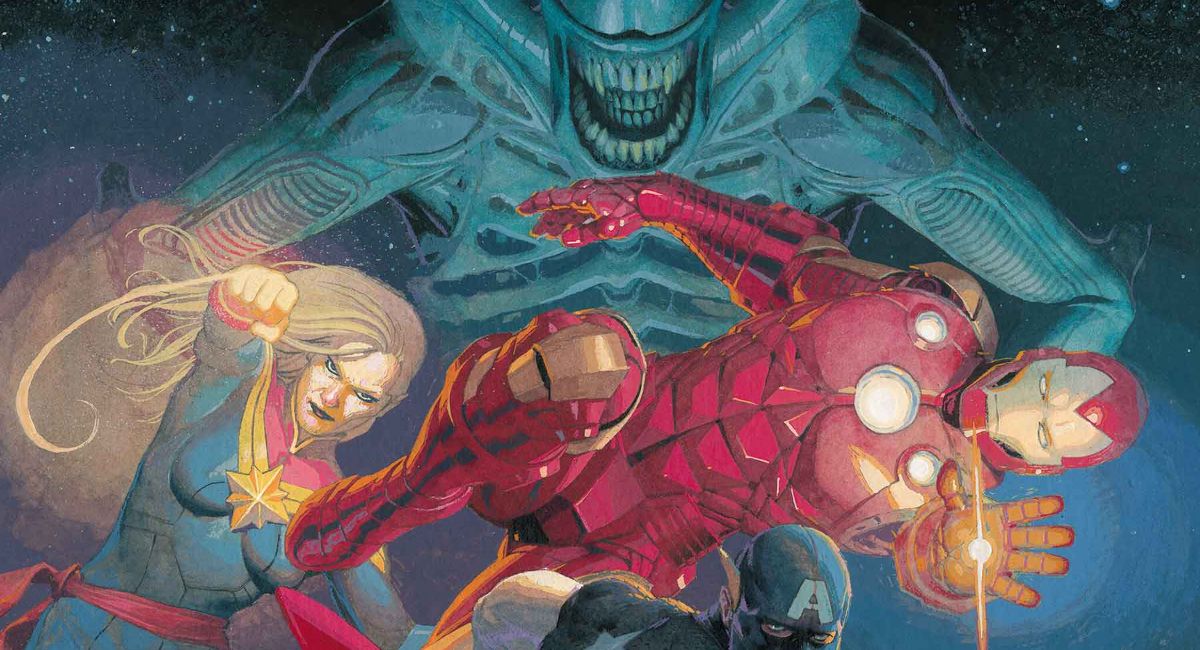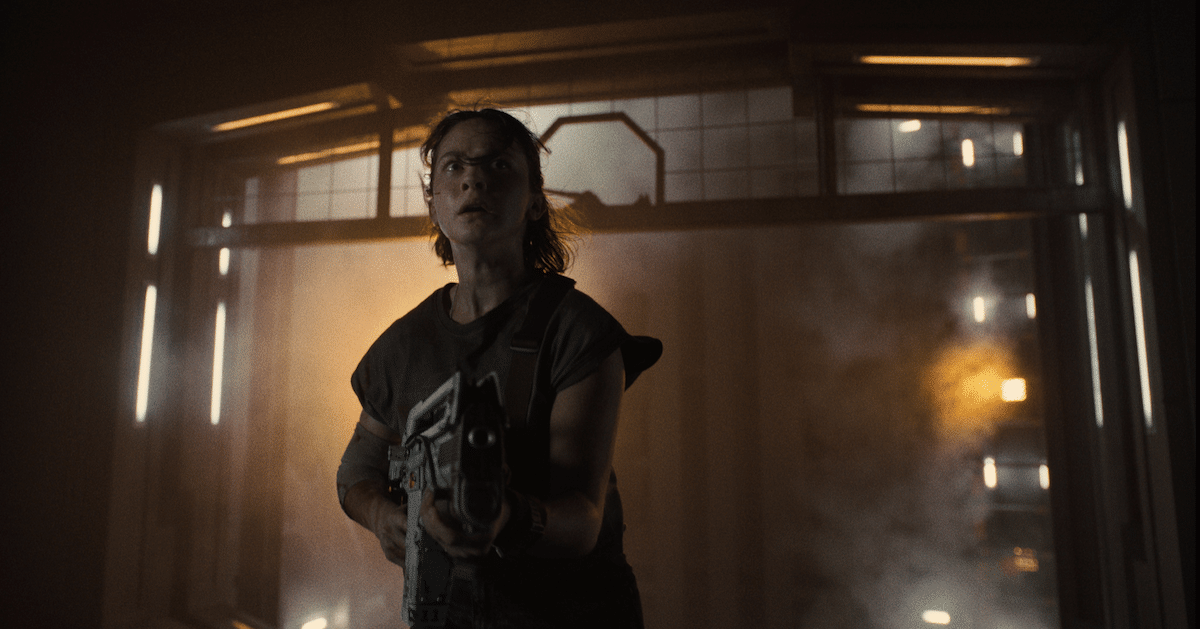For many, Prometheus was a love-it-or-hate-it experience. For me, it was a disappointment because it felt like a movie of promising but unfulfilling half-measures: raising interesting questions but failing to deliver any logical answers, bringing in new characters heavily templated on old ones – Elizabeth Shaw as a sort of New Ripley and David as our New Ash. It had a lot of interesting ideas and some good moments, but was overstuffed and confusing, ultimately failing in execution.
So it wasn’t a big surprise to see that Alien: Covenant shied away from the Prometheus angle in marketing and focused once again the human v. xenomorph factor instead. In fact, even though Michael Fassbender returned for the follow-up, I wasn’t expecting there to be any connective tissue between Prometheus and this film at all. It turns out there is – sort of. But it’s mostly pointless and unsatisfying, awkwardly fusing itself with a tepid remake of the original Alien film.
Alien: Covenant takes place shortly after Prometheus and focuses on a group of humans heading to a new colony in cryosleep. Something goes wrong and essential crew wake up mid-journey, where they happen to stumble upon a distress signal from a nearby planet with hospitable conditions. The crew consists of some archetypes, including your standard Alien issue “tough female protagonist,” but unfortunately, if you’re like me, you’ll walk out of the movie without remembering anyone’s name. Said group of humans decide to answer the distress signal and end up spending the rest of the movie running, screaming, and having creatures burst out of their bodies.
It’s arguable that Ripley is one of science fiction’s best-known characters, and she anchored the Alien films by providing true stake in the outcome of the humans. Noomi Rapace’s portrayal of Elizabeth Shaw in Prometheus didn’t quit live up to her inspirational archetype, but I liked her – and at least recognized her as a clear protagonist. The most serious flaw of Alien: Covenant is that it provides us with yet another Ripley-like-stand-in via Katherine Waterston’s character, which at this point resembles an illegible copy of a copy of a copy. Waterston isn’t at fault, but her character development is almost non-existent, relying wholly on the hope that you’ll associate her enough with Ripley to forgive the fact that she’s written primarily as a foil for David.
In the original Alien films there was also a thematic emphasis on the roles of mothers, both via Ripley and the aliens, while the latest films have shifted focus to of the father. This was badly pronounced by Charlize Theron’s character in Prometheus, and we see more of it in Alien: Covenant, particularly with Michael Fassbender’s David. And while Fassbender’s performance and role in this film is basically the only part of it I enjoyed, that new paternal thematic weight doesn’t really work when the film’s protagonist has no connection to it. In fact, there was almost no room for any of the human characters in Alien: Covenant. The plot of this movie was entirely about androids and creation, a sort of Frankenstein take on the franchise. Removing the human element from the plot made the horror much less visceral.
I think the filmmakers rightfully seized on one of the MVPs from Prometheus in Michael Fassbender, but unfortunately building a whole film around him was ultimately damaging to the overall story of Alien: Covenant. I hope if Fassbender continues to be the face of the franchise going forward, they find a fresh way to tell the story, rather than relying on the classic Alien formula without the key ingredient.








Hollywood braces for “franchise fatigue.”
http://www.latimes.com/business/hollywood/la-fi-ct-summer-box-office-20170505-story,amp.html
Quotes from producers:
“Man, this is depressing … It is just entirely sequels and franchise, and something’s got to give.”
“Some of the tent poles are just not as strong this year … Pirates (of the Caribbean)? It’s the fifth one. Transformers? It’s the fifth one.”
I’ll give Scott credit for this. Just as Cameron succeeded by turning the Alien concept into a war movie, Scott’s attempt to morph it into a mad scientist flick at least shows he’s honestly trying. But I think you can sum up Covenant by noting that in the biggest set action piece of the whole thing, not one single human character is ever in any real peril.I
It’s just basically incompetent storytelling.
My biggest issue with the film is that it basically exists to answer a question that no one was really asking, and the more intriguing elements of Prometheus are, more or less, discarded.
It’s also not really scary in any way.
So really, it’s a film made for basically no one. Not Alien fans, not Prometheus fans, and its attempts to bridge the gap are utterly incompetent.
Covenant is almost like someone is taking you behind the scenes of a typical Alien movie, and revealing how everything works and where it comes from. Its like “look! Here’s the man holding the xenomorph puppet who would normally be just out of frame! It just sucks all the tension out of the experience. The original Alien was a Hitchcock movie in space. This is like…. The sisterhood of the traveling space goop.
If the film had ended ten minutes before it did, it would have worked much better. I was afraid I saw the ending coming but they deliberately trick you into thinking that won’t happen, and then it does. Doing that means that people won’t be going back to see it again and these movies depend on repeat viewings (like Guardians of the Galaxy is getting) to be a real success. Walking out of the theater I overheard someone say, “If they make a sequel to this, I’m not going to see it.” Plus the ending of Prometheus promised a lot and then it didn’t deliver it here.
Saw this in Jason Shawan’s review for Nashville Scene:
“The marketing for the film even released two prologue shorts to help bolster the filmspace, and they are absolutely essential. Without the “Last Supper” short, we don’t even realize that we actually have gays in space in this movie, which is frustrating but par for the film industry course (thanks for nothing, Russia, China and India — markets known for banning films with depictions of gay characters).”
When “liberal” Hollywood knuckles under to a reactionary global market.
Comments are closed.